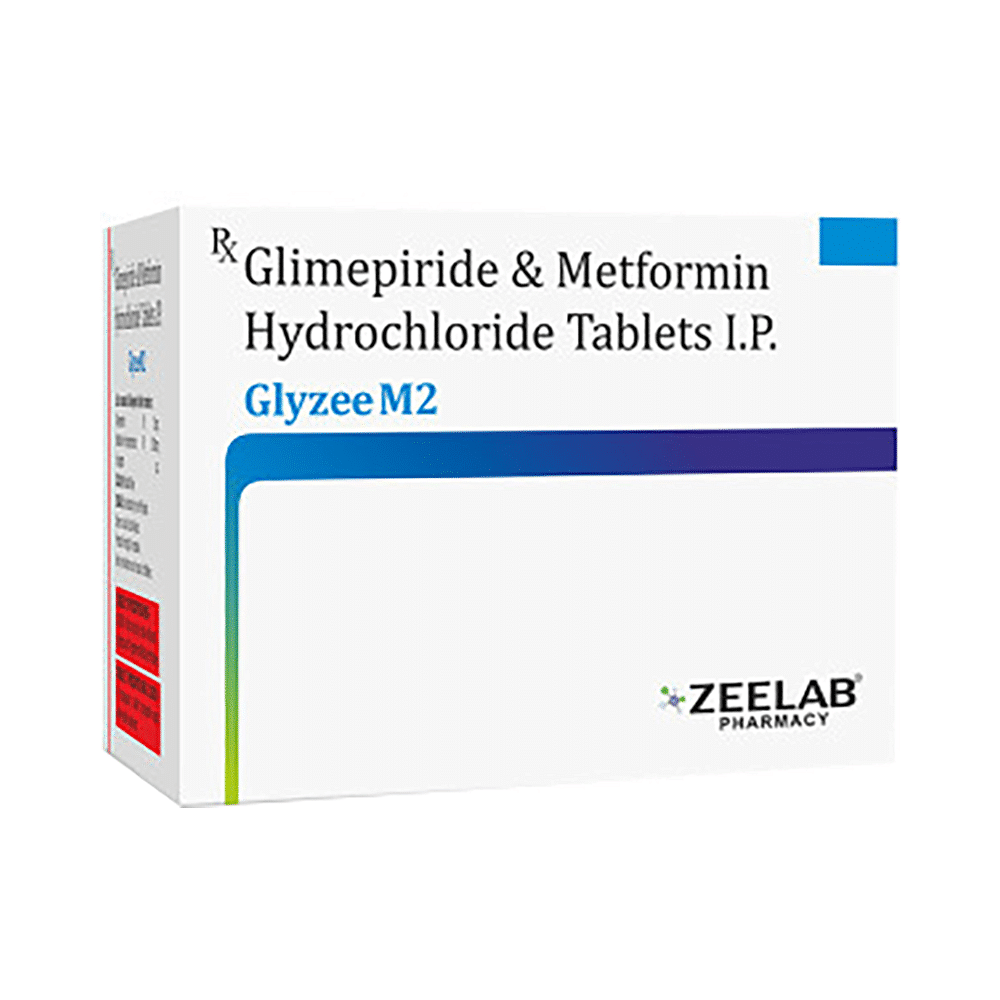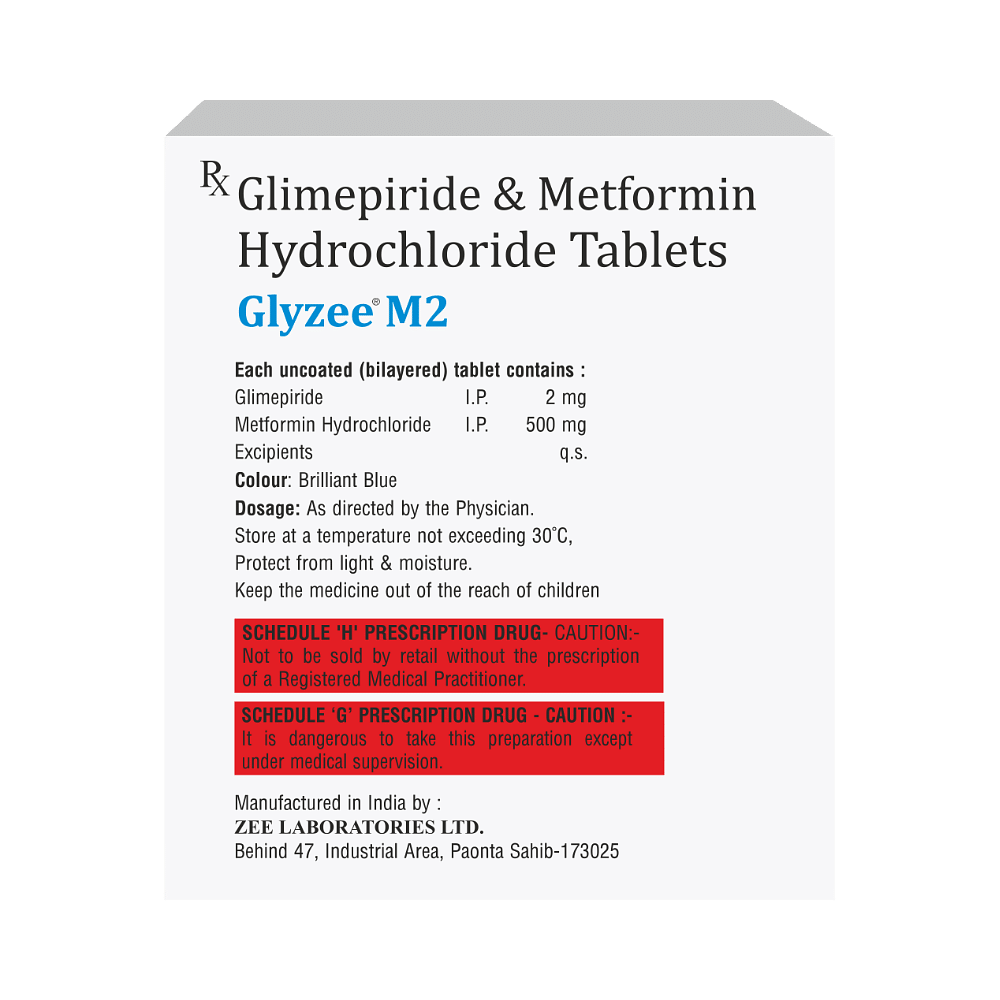

Glyzee M2 Tablet
Manufacturer
Zeelab Pharmacy Pvt Ltd
Salt Composition
Glimepiride (2mg) + Metformin (500mg)
Key Information
Short Description
Glyzee M2 Tablet is a combination of two medicines used to treat type 2 diabetes mellitus in adults. It helps control blood sugar levels in people with diabetes.
Dosage Form
Tablet
Introduction
Glyzee M2 Tablet belongs to a category of medicines known as anti-diabetic drugs. It is a combination of two medicines used to treat type 2 diabetes mellitus in adults. It helps control blood sugar levels in people with diabetes.
Directions for Use
Take this medicine in the dose and duration as advised by your doctor. Swallow it as a whole. Do not chew, crush or break it. Glyzee M2 Tablet is to be taken with food.
Safety Information
Side Effects
It can cause hypoglycemia (low blood sugar level) when used with other antidiabetic medicines, alcohol or if you delay or miss a meal. Monitor your blood sugar level regularly while you are taking this medicine. Tell your doctor immediately if you experience any deep or rapid breathing or if you have persistent nausea, vomiting, and stomach pain as Glyzee M2 Tablet may cause a rare but serious condition called lactic acidosis, which is an excess of lactic acid in the blood. Your doctor may check your liver function regularly. Inform your doctor if you develop symptoms such as abdominal pain, loss of appetite, or yellowing of the eyes or skin (jaundice).
Alcohol Warning
It is unsafe to consume alcohol with Glyzee M2 Tablet.
Breastfeeding Warning
Glyzee M2 Tablet is unsafe to use during breastfeeding. Data suggests that the drug may cause toxicity to the baby.
Pregnancy Warning
Glyzee M2 Tablet may be unsafe to use during pregnancy. Although there are limited studies in humans, animal studies have shown harmful effects on the developing baby. Your doctor will weigh the benefits and any potential risks before prescribing it to you. Please consult your doctor.
How it works
Glyzee M2 Tablet is a combination of two antidiabetic medicines: Glimepiride and Metformin. Glimepiride is a sulfonylurea which works by increasing the amount of insulin released by the pancreas in order to lower the blood glucose. Metformin is a biguanide which works by lowering glucose production in the liver, delaying glucose absorption from intestines and increasing the body's sensitivity to insulin.
Quick Tips
You have been prescribed this combination medicine as it can control blood sugar better than metformin alone. You should continue to exercise regularly eat a healthy diet and take your other diabetes medicines along with Glyzee M2 Tablet. Take it with food to lower your chance of having an upset stomach. Monitor your blood sugar level regularly while you are taking this medicine. Tell your doctor immediately if you experience any deep or rapid breathing or if you have persistent nausea, vomiting, and stomach pain as Glyzee M2 Tablet may cause a rare but serious condition called lactic acidosis, which is an excess of lactic acid in the blood. Your doctor may check your liver function regularly. Inform your doctor if you develop symptoms such as abdominal pain, loss of appetite, or yellowing of the eyes or skin (jaundice).
Related Medicines

Diaprid-M 2mg/500mg Tablet

Glucut 2 MT Tablet

Glimenita M Forte 2mg/500mg Tablet

Prideglim M 2mg/500mg Tablet

Vipride M 2mg/500mg Tablet

Gmp M 2mg/500mg Tablet

Glydip M 2mg/500mg Tablet

Glimicure M 2 Tablet

Bioglim M 2mg/500mg Tablet

G2 MF 2mg/500mg Tablet
Frequently asked questions
What are the recommended storage conditions for Glyzee M2 Tablet?
Store Glyzee M2 Tablet in its original container, tightly closed, according to the instructions provided on the packaging or label. Dispose of unused medicine properly and ensure it is not accessible to pets, children, or other individuals.
Can the use of Glyzee M2 Tablet lead to lactic acidosis?
Yes, using Glyzee M2 Tablet may cause lactic acidosis, a rare but serious medical condition resulting from elevated blood lactate levels. This is more likely in patients with kidney disease, older adults, or those consuming excessive alcohol. Symptoms include muscle pain or weakness, dizziness, fatigue, cold extremities, difficulty breathing, nausea, vomiting, stomach pain, or slow heart rate. If you experience these symptoms, stop taking Glyzee M2 Tablet and consult your doctor immediately.
What is Glyzee M2 Tablet?
Glyzee M2 Tablet is a combination medication containing Glimepiride and Metformin. It is used to treat type 2 diabetes mellitus in adults when taken along with a balanced diet and regular exercise. Glimepiride lowers blood glucose levels by stimulating insulin release from the pancreas, while Metformin reduces glucose production in the liver and improves insulin sensitivity. This combination is not suitable for treating type 1 diabetes.
What are the possible side effects of Glyzee M2 Tablet?
Common side effects associated with Glyzee M2 Tablet include hypoglycemia (low blood sugar), altered taste, nausea, stomach pain, diarrhea, and headache. Rare but serious side effects may include lactic acidosis. Long-term use can also lead to Vitamin B12 deficiency.
Can the use of Glyzee M2 Tablet lead to Vitamin B12 deficiency?
Yes, using Glyzee M2 Tablet for an extended period may cause Vitamin B12 deficiency due to interference with stomach absorption. Untreated, this can result in anemia and nerve problems, causing symptoms like tingling sensations or numbness in hands and feet, weakness, urinary issues, changes in mental status, and balance difficulties.
Can the use of Glyzee M2 Tablet cause hypoglycemia?
Yes, taking Glyzee M2 Tablet can lead to hypoglycemia (low blood sugar). Symptoms include nausea, headache, irritability, hunger, sweating, dizziness, rapid heart rate, and feeling anxious or shaky. Regular monitoring of blood sugar levels is essential, especially when combined with other diabetes medications or missed/delayed meals, alcohol consumption, or increased physical activity.
Is it safe to take alcohol while I am also taking Glyzee M2 Tablet?
No, consuming alcohol while on Glyzee M2 Tablet may lower blood sugar levels and increase the risk of hypoglycemia and lactic acidosis. It is not recommended to take these substances together.


